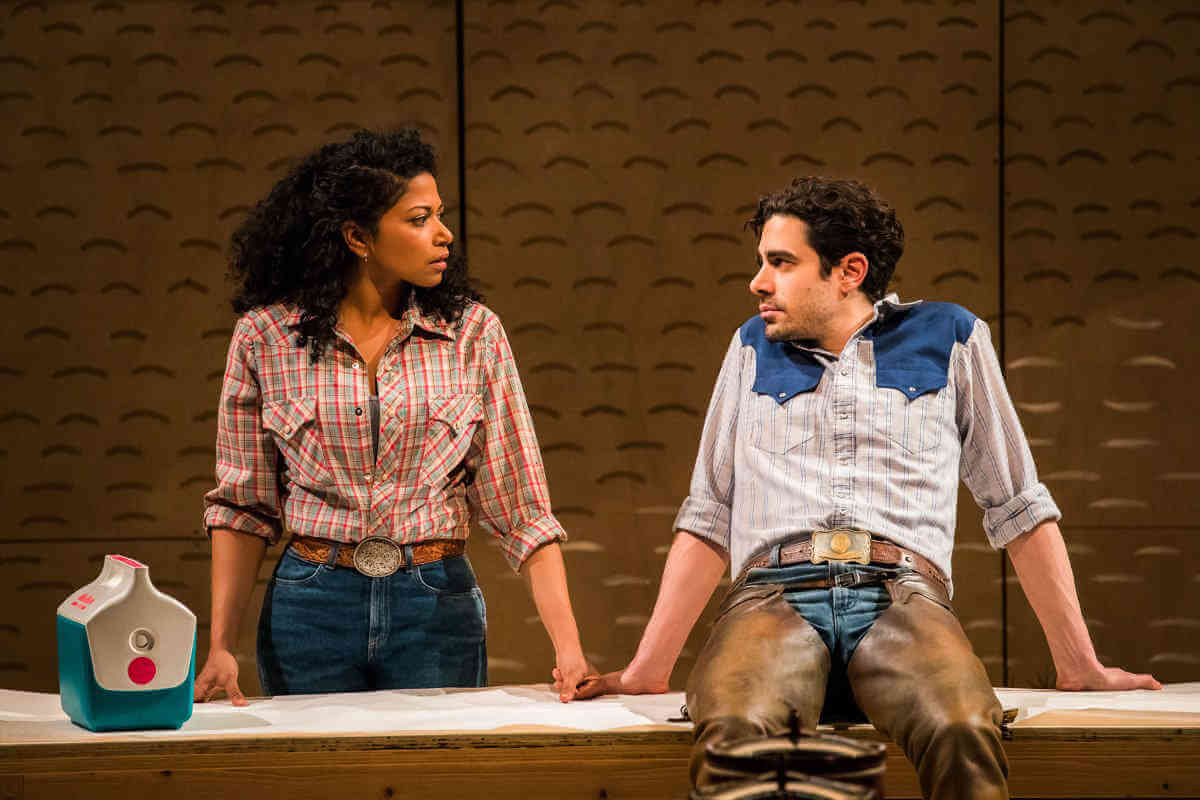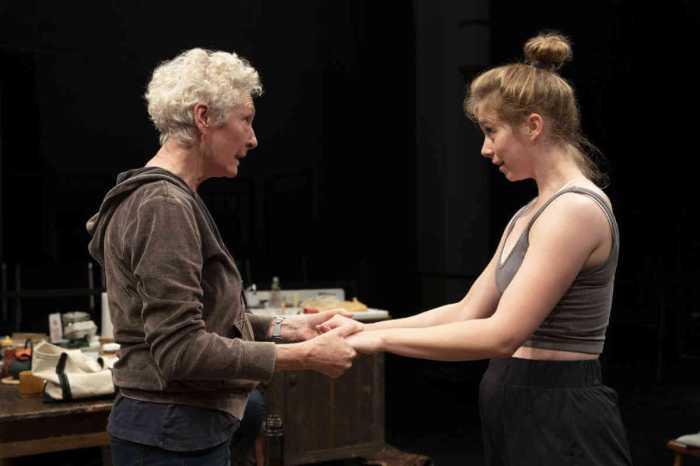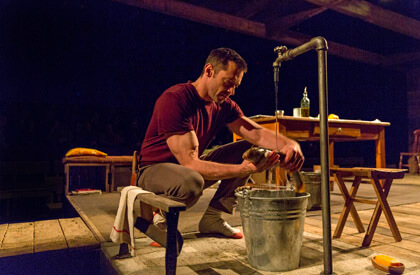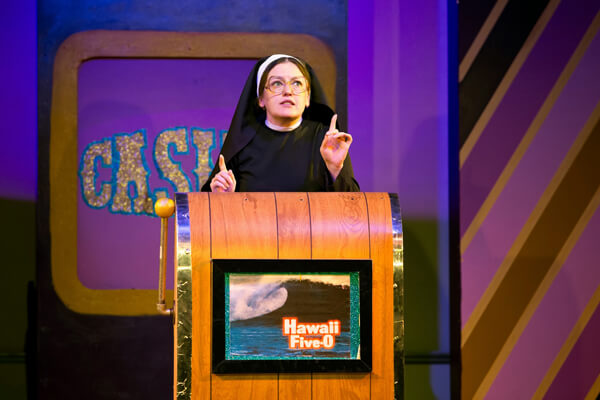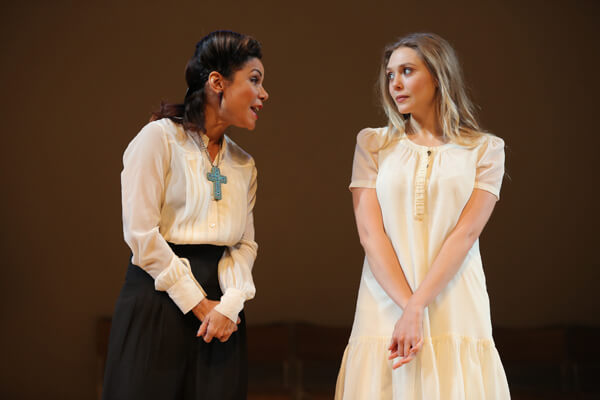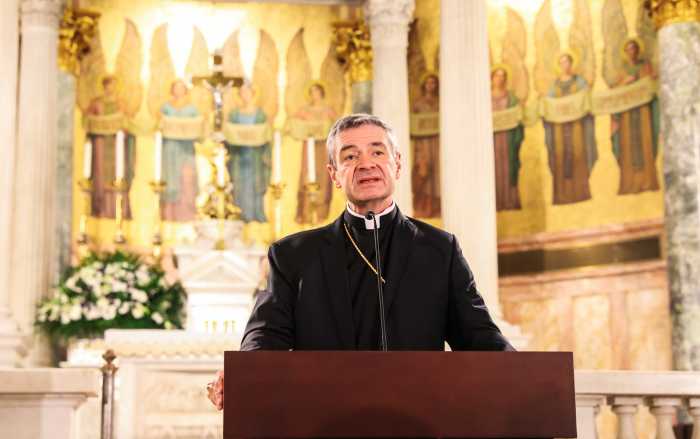The magnificent and thrilling revival of “Oklahoma” now on Broadway will not be for all tastes. For those who cling to gauzy nostalgia for the seminal American musical as a tale of unbridled jingoism, manifest destiny, and cute romance in the early 20th century, the stripped down, visceral, and sexually-charged production from visionary director Daniel Fish will be shocking. But that shock is exactly what makes this production so breathtaking and theatrical. Just as David Cromer did with “Our Town” a decade ago, eschewing dewy-eyed reverence for a beloved oldie, Fish forces the audience to encounter “Oklahoma” anew as a gritty tale of tenuous survival in an often inhospitable environment where an event as innocent as a town picnic has life-or-death implications.
What this production makes clear is that for every “beautiful mornin’,” people struggled to eke out a living on the unforgiving land that was the Oklahoma territory–turning-state of 1907. The show’s characters — familiar from countless stage productions and film — have been given an immediacy and integrity seldom seen. The simple story of cowboy Curly and his rivalry with hired hand Jud Fry for the hand of Laurey has become a high stakes game with an immediacy and complexity confronted head on.
Those complaining that this “Oklahoma” would make Rodgers and Hammerstein spin in their graves may not fully understand what drove those creators as they transformed musical theater. They were committed to tackling serious topics. “Carousel” exposed the violence and risks of toxic relationships. “Allegro” questioned the American success ethic. The duo embraced the inherent theatricality of life’s darker sides, and the cheerful lyricism of their scores has always stood in stark counterpoint to those themes pulsing beneath. Creating a stark conflict between reality and romanticism may be precisely what the authors originally intended.
The show unfolds in a large plywood arena, created by Laura Jellinek and is performed in Scott Zielinksi’s full blaze of houselights at full for most of the performance. This suggests how relentless the sun might have been on the plains — and makes the moments of darkness and color both surprising and affecting. Daniel Kluger’s orchestrations for the small band that sits on the stage have a twangy, bluegrass quality that complements the production’s starkness while allowing the familiar songs to be heard as if new.
The casting has no room for coyness in executing this realistic reading. Both Damon Daunno as Curley and Rebecca Naomi Jones as Laurey are overtly sexual in their sparring and sparking with one another — younger and more alive than the typical waxwork presentation of these characters. They sing with urgency and presence, allowing us to hear a subtext in these songs of longing and even lust. Jones is aware of her own agency and not afraid to use it.
Ali Stroker is also unabashedly sexual as Ado Annie, a woman always intent on loving the one she’s with. She effectively drives her beau Will Parker, a charming and geeky/ sexy James Davis, crazy before settling down. The always-wonderful Mary Testa is a tough and cold-eyed realist as Aunt Eller, her hard take on some of the singing demonstrating again what a versatile actress she is. Patrick Vaill as Jud, Curly’s rival for Laurey’s affections, has a depth not usually associated with this character. He suffers for Laurey, and in his desperation, we can’t help feel for him as he loses what seems to be his last chance for love.
Typically, “Oklahoma” ends with the audience going out on a high, with “plenty of heart and plenty of hope” as Laurey and Curly start out their new life in a “brand new state.” Not this time. Without changing a word of the book or the lyrics, this production makes us keenly aware that joy comes — but at a cost. This production’s unflinching honesty makes for much more moving and thought-provoking theater.
“The Cradle Will Rock,” Marc Blitzstein’s “play in music” from 1937 is as much a legend as it is a piece of theater. The piece became notorious when Orson Welles presented it with a single piano on a bare stage after their original theater had been shut down due to conflicts between managers and unions. Subsequent productions largely repeated the stripped-down format, including the famous New York production in 1983 that starred Patti LuPone. It’s quasi-Brechtian, allegorical structure has appealed to actors and theater companies, but it remains a difficult piece with a complicated, if fascinating score and a disjointed book that is a series of 10 scenes set in Steeltown, USA. Taking on oppressive capitalism, religion, and the union movement with satire and stridency, the show champions the little guy’s endless fight against a tyrannical system.
Given the problematic nature of the piece — and the decades of political theater and agitprop that have followed — the new production at CSC is more successful as an historic re-creation than an affecting political musical. John Doyle’s spare staging with one piano played in three quarters proves problematic when actors have their backs to two-thirds of the house. The stories are difficult enough to follow without making it challenging to hear dialogue. The scaled down cast of 10 — versus an original 30 — demands lots of doubling of parts, which adds to the confusion.
Still, some moments are quite successful. The score, played by cast members who rotate on and off the piano bench, is rich and energetic. The singing is strong and often forceful. Tony Yazbeck is charismatic and moving singing the title song. Lara Pulver as Moll, a prostitute who refuses to be bought, delivers the most compelling song of the evening, “Nickel Under Foot,” and Benjamin Eakeley is outstanding as the preacher whose sermons are for sale. The rest of the company, notably David Garrison, Sally Ann Triplett, Eddie Cooper, and Kara Mikula throw themselves into the proceedings with gusto, as they take on different roles.
The original intent of the piece was to rouse audiences to fight for the rights of workers. Perhaps 80 years on we have been desensitized to this type of political theater, as so little seems to have changed. Today, the satire seems strident and dated. Or perhaps the nature of the material keeps the audience at a distance, intellectually stimulated but emotionally unengaged. Whatever it is that keeps this production from firing up our guts, you may appreciate this production for its subject matter and timeliness but it’s unlikely you will be rocked.
OKLAHOMA! | Circle in the Square, 1633 Broadway at W. 50st St. | Through Sep. 1: Tue., Thu. at 7 p.m.; Wed., Fri.-Sat. at 8 p.m.; Wed., Sat. at 2 p.m.; Sun. at 3 p.m. | $69.50-$249.50 at oklahomabroadway.com or 212-239-6200 | Two hrs., 45 mins., with intermission
THE CRADLE WILL ROCK | Classic Stage Company, 136 E. 13th St. | Through May 19: Tue.-Thu. at 7 p.m.; Fri.-Sat. at 8 p.m.; Sat.-Sun. at 2 p.m. | $82-$127 at classicstage.org or 866-811-4111 | Ninety mins., no intermission


